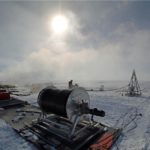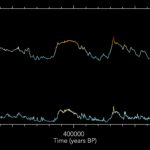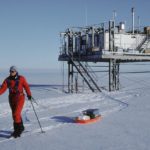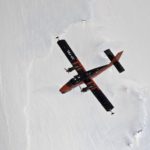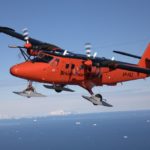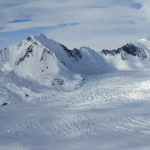PRESCIENT (UK Polar Research Expertise for Science and Society) is a joint programme between BAS (British Antarctic Survey) and CPOM (the Centre for Polar Observation and Modelling).
The programme supports strategically-important, long-term measurements and specific capabilities that BAS and CPOM deliver for the wider science community. These are organised in four science areas:
Polar and Mountain Climate Data Records. We will deliver six activities to support climate observations and modelling: i) year-round observations of climate-sensitive parameters on the rapidly-warming Antarctic Peninsula to understand interconnections within this changing system; ii) an ice coring and analysis capability to underpin projects that learn from the past to inform future climate predictions; iii) a capability for airborne atmospheric sensing, upgrading the data capture system and progressing transition to low carbon autonomous platforms; iv) a satellite data processing capability with improvements to sea ice altimetry retrieval; v) an improved sea ice modelling component for the UK Earth System Model (UKESM); vi) a network to measure snowfall in mountain regions, to inform weather and climate models and support decisions around water resources.
Southern Ocean Biological Observatories. We will support long-term observations in regions of the Southern Ocean to understand how ecosystems are affected by change (climate, sea ice, pollution) and how such stresses impact plankton community structure, biodiversity and productivity, life-cycle behaviour, and vertical migration. New autonomous platforms and novel technologies, including eDNA, will underpin this research.
Antarctica’s contribution to Sea-Level Rise. We will deliver five activities that support our ability to make robust predictions about future global sea level: i) a capability to process satellite data of land ice, to understand current global changes in ice sheets; ii) maintenance and development of UKESM elements that address land ice to improve future predictions of ice loss; iii) an improved airborne radar capability to inform on under-ice basal properties; iv) an improved hot water drilling capability that enables deployment of instruments below ice shelves, ice sheets, and ice streams; v) enhancements to our sustained oceanic observations near and beneath ice shelves – critical to understand the ocean’s role in driving ice shelf loss.
Space Weather Observatory. We will deliver sustained observations of space weather parameters through the 2025 solar maximum and the descending phase that will support numerical modelling that informs the UK Risk Register on space weather threats. Our Antarctic network will be expanded with new instruments and greater geographic range to fill previous observational gaps.
PRESCIENT will aid the BAS transition to low carbon science delivery. For example, delivery of airborne science using remotely piloted autonomous systems (RPAS) will be progressed, building on the recent learning from the WINDRACERS project.
PRESCIENT also supports the delivery of National Public Good. We will deliver independent scientific advice and support to a range of stakeholders in government, business, and wider society, ensuring that our scientific activities and expertise is available to support solutions.
As required for National Capability (NC) research, the activities offered in this proposal will provide crucial support to the UK and international research communities, underpinning existing programmes, grants, fellowships, studentships, supporting future activities, widening participation in polar science, and providing independent expert advice to stakeholders.
PRESCIENT has a number of specific objectives that will be delivered by BAS and CPOM:
- To acquire and understand polar and mountain climate data records in order to document changes in Earth’s frozen regions and support reliable representations of their future evolution, ultimately allowing stakeholders to form climate change mitigation plans.
- To expand our capability to understand the role and response of polar marine ecosystems to changes in environmental stressors, including temperature, sea ice, and pollution, by applying novel technologies and sensors.
- To build our capability to measure and predict polar ice sheet contributions to global sea level rise and assess the likelihood of reaching tipping points in the polar cryosphere.
- To extend Antarctic space weather observations through the 2025 solar maximum, a high risk period for satellites and ground infrastructure, delivering data to global networks and supporting activities within the UK National Risk Register.
In all of the above we will capture sustained observations and publish fully-quality-controlled datasets which will be open-access and AI ready.
We will also deliver underpinning capabilities, such as numerical models and field research platforms, that will be accessible to UK/international researchers and the programmes in which they are involved. These capabilities will be offered on a collaborative basis.
Our National Public Good activities will generate and maximise impact from our science and operations in wider communities of government, business, and public society. To achieve our NPG objectives, expertise is drawn from all of BAS’s science programmes and their operational interfaces.
We will manage and deliver our programme, on time and to budget, including our broad cross–programme activities that align to NERC strategic ambitions in Digital, Net Zero, and EDI.

Marine Autonomy Engineer
CPOM
| Name |
Institution |
|
PRESCIENT Involvement |
| Andrew Shepherd |
Northumbria |
|
PRESCIENT co-lead |
| Inès Otosaka |
Northumbria |
|
PRESCIENT WP3 co-lead |
| Rosemary Willatt |
Northumbria |
|
PRESCIENT WP1 co-lead |
| Charlotte Royle |
Northumbria |
|
PRESCIENT WP6 co-lead |
| Danny Feltham |
Reading |
|
WP1 |
| Tony Payne |
Liverpool |
|
WP3 |
| Sammie Buzzard |
Northumbria |
|
WP1, WP3 |
| Mal McMillan |
Lancaster |
|
WP3 |
| Steph Cornford |
Bristol |
|
WP3 |
| Alan Muir |
UCL |
|
WP1, WP3 |
| Andy Ridout |
UCL |
|
WP1 |
| David Schroeder |
Reading |
|
WP1 |
| Tom Mitcham |
Bristol |
|
WP3 |
| Ben Palmer |
Northumbria |
|
WP1, WP3 |
| Tom Slater |
Northumbria |
|
WP3 |
| Jenny Maddalena |
Lancaster |
|
WP3 |
| Lucy Sharpson |
Northumbria |
|
WP6 |
| Nicola Bortun |
Northumbria |
|
WP6 |
28 April, 2025
Cambridge, 28 April 2025: The British Antarctic Survey (BAS) is hosting a two-day kick-off meeting this week to launch the ambitious new £8.4 million PRESCIENT programme. This major initiative, funded …
7 October, 2024
British Antarctic Survey (BAS) is a beneficiary of a major investment in the UK’s network of leading environmental science research centres announced today (8 October). Funding of £8.4 million, from …
Science, business and operational planning
Accessing subglacial environments
UK national facility and capability
Specialist ice core facility to measure concentration and isotopic composition of greenhouse gases
Specialised observatory with a suite of instruments to measure the air and snow chemistry around Halley.
Discover the UK's national capability to support science from the air
Airborne instrument capability
Two of the four BAS Twin Otters are equipped with a full remote sensing capability, providing scientists with data on land, ice and sea. This includes VNIR & SWIR hyperspectral …
Enabling ice observation programmes



